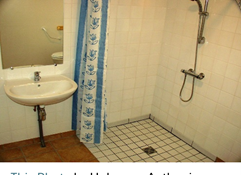Aids and adaptations 2025

Aids and Adaptations for Council Tenants
It is recognised that in some instances the accommodation that our tenants live in may no longer be suitable to support their needs and we are committed to providing effective aids and adaptations or alternative suitable accommodation.
Council Tenants are unable to apply for a Disabled Facilities Grant and here at Mid Devon Housing (MDH) we offer our tenants a service that can provide aids and adaptations to enable them to remain independent in their homes.
You can watch a handy video on the process of a level access shower install, you can view it here.
Where a tenant or a member of their household has a disability or long-term illness, MDH will consider the provision of equipment or adaptations to their home to enable them to continue living in the property. In determining the scope of works, MDH will take into account any advice or recommendations provided by relevant health professionals and will agree the proposed adaptations with the tenant and/or household member.
Major adaptations will typically not be approved in the following situations:
- Under- or Over-Occupation: Where the property is not appropriately sized for the household (e.g., too large or too small).
- Additional Space Requirement: Where an extra bedroom or living space is needed and suitable alternative accommodation is available within the local area.
- Level Access Shower: Where installation is requested in properties located on the first floor or above without lift access, or in bathrooms within family-sized homes that are under-occupied.
- Impact on Amenity: Where proposed works, such as parking bays or access ramps, would significantly detract from the visual or environmental amenity of the area.
- Future Letting Constraints: Where adaptations would substantially reduce the Council’s ability to re-let the property in the future and suitable alternative accommodation is available.
- Possession Proceedings: Where the Council is actively seeking possession of the property due to a breach of tenancy conditions.
Prior to undertaking any adaptations over £250, MDH will assess whether the proposed works are reasonable and practicable. This assessment will take into account the nature of the adaptations required, as well as the age and condition of the property. Where it is considered more appropriate for the tenant or a member of their household to relocate to an alternative property, including accommodation provided by another housing provider, MDH will discuss the available options with them. MDH will ensure that its housing stock is utilised in the most effective manner.
If the adaptation is under £250 we will not require an assessment, you can contact your Neighbourhood Officer to find out more.
Where a decision is made not to authorise adaptations, we will work with the relevant
Occupational Therapist and the tenant or other permanent member of the household or their appointed representative to look for alternative solutions to meet their needs; these options could be:
- Rehousing
- Alternative adaptations
Tenants may also have the option to request permission to make alterations themselves (secure tenants only).
For adaptations costing between £250 and £1,000, the Council will require a referral from an Occupational Therapist. Examples of adaptations within this range include ramps, safety glass, and minor internal alterations to kitchens or bathrooms.
MDH will provide major adaptations to assist eligible tenants and household members in living independently. Major adaptations typically involve significant structural alterations and will generally cost more than £1,000.
Major adaptations will only be undertaken based on the assessment and recommendation of an Occupational Therapist to ensure they are effective and meet the residents’ specific needs.
Examples of major adaptations include: improvements to property access (such as ramps and drop kerbs), widening doorways, installing level-access showers, altering heating or lighting controls, fitting stair lifts, reconfiguring bathrooms or kitchens, and, where necessary, extending the property.
Major adaptations over £30,000 will only be undertaken in exceptional circumstances when no other alternative solutions or suitable properties are available.
To apply you will need to arrange for an OT to send us a ‘Statement of Need’. To arrange this you will need to contact Care Direct or your GP direct.